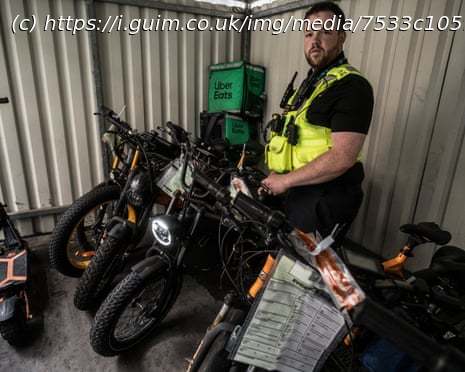E-bikes can legally travel at 15.5mph. But the fastest the police have seized was capable of 70mph. What will stop the rise of these souped-up and potentially fatal vehicles?
E-bikes can legally travel at 15.5mph. But the fastest the police have seized was capable of 70mph. What will stop the rise of these souped-up and potentially fatal vehicles?
A busy Wednesday morning on Bishopsgate in London and Sgt Stuart Ford of the City of London police is pointing out possible offenders. “He’s not pedalling,” he says, indicating a man on a bike on the other side of the road. “Still not pedalling, but he is going downhill, he might be all right. I’d still pull him over and have a look.”
Not today, though, because the non-pedalling possible offender is heading north, while Ford’s team – two members of the cycle response unit he set up two years ago and leads – are facing south on the opposite side of the road. A lot of the unit’s work centres on illegal e-bikes; they have seized 212 so far this year.
News comes over the radio that PCs Harry Rose and David Parker have stopped someone they suspect is on an illegal e-bike, so we find them with a delivery rider in the familiar green livery of Uber Eats. The man, whose name is Mahede Hasan, says his bike has pedals, and the power of the electric motor is 250 watts, which he thought was allowed.
Ford tilts the bike on its stand and twists the throttle on the right handlebar. “That’s illegal for a start,” he says. “You should pedal to make the motor work.” The bike doesn’t go anywhere, because the spinning back wheel is off the ground, but the speedometer climbs – 20, 30, 40, 50, 52km/h. That’s about 32mph. “What do you think the top speed of this bike should be, with pedal assist?” he asks Hasan, who doesn’t know, so Ford tells him. “15.5mph [25km/h]. This is basically a motorcycle.”
E-bikes aren’t illegal per se, and you will no doubt have noticed their increased popularity in UK cities, including the proliferation of rental ones (you might have views on them blocking pavements, or the fact that the ever-present background noise of urban Britain is the click click click of a kid on a stolen Lime bike, but that is a different issue). To be legal, which the rental bikes are, an e-bike needs to meet certain criteria. These include having pedals that can be used to drive the bike, an electric motor with a maximum power output of 250W, and a maximum assisted speed of 15.5mph. That doesn’t mean they can’t go faster, if you pedal hard or go downhill, just that the motor won’t help above that speed. Essentially, they’re bicycles with a bit of help, and that’s how they’re treated: you don’t need a licence, registration or insurance to ride one.
The trouble is a lot of e-bikes aren’t legal to ride on the road, but they are very easy and cheap to get hold of. While the officers complete their paperwork, Hasan, 21, tells me he bought his bike new, on the internet, for £600. “I got it because I do, like, eight or nine hours a day, and if I’m only pedalling I’m going to get more tired. An e-bike makes it more comfortable.” Originally from Bangladesh, he has put a sticker showing a map of the country on the front mudguard.
He assumed the bike was legal because there was nothing on the website he bought it from that said it wasn’t. “If it’s not, how do they sell it to people?” He says that if he’d known he was breaking the law, he wouldn’t have stopped when they pulled him over. The cycle response unit operates on pedal bikes. “I believe they wouldn’t catch me,” he says.
The officers tell him they’re seizing the bike, and he asks if he can keep the detachable battery, which they allow, while he cancels the lunch order he was due to deliver. “It’s going to affect my account because when you accept a job, that means you’re committing to delivering to the customer. If you don’t, that’s your problem, not the company’s.”
Back at Bishopsgate police station, Ford shows me the pound with some of the other bikes they’ve seized over the past few days (from here they get taken away to be crushed). There’s one that’s probably 500 or 750W. The pedals aren’t even connected to the chain to turn the wheel – it’s not even pretending to be a bicycle. Several have been converted from regular pedal bikes, using kits, also readily available. Again, not illegal in itself, so long as the motor is not bigger than 250W – you can generally tell from the size of the hub on the rear wheel. A few seconds on my phone, and I’ve found a 3,000W conversion kit, made in China, that I can have delivered for £142.59. I can’t see anything about it being illegal to ride on the road in the UK.
Ford estimates that about three-quarters of the illegal e-bikes they deal with are ridden by food delivery riders. They’re getting wise to the clampdown. “They’ll come down the road, see us, spin round, that’s usually a giveaway they’re on an illegal bike. We’ll then try to catch up with them if we can.”
E-bikes – usually high-powered, ready-made ones – are also the vehicle of choice for gangs of phone snatchers, Ford adds: “Because they’re so quick, and they can’t be detected because they’ve got no licence plates and [if the riders are wearing helmets] you can’t see who they are.
Home
United States
USA — IT Britain’s illegal e-bike boom: desperation, delivery drivers – and unthinkable danger






